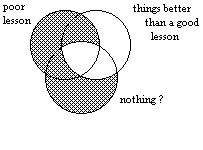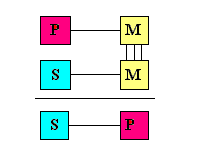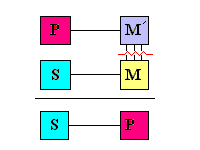I.. Consider the following argument:
|
| "A poor lesson is better
than a good lesson because a poor lesson is better than nothing, and nothing is better
than a good lesson." |
|
A. Note how in the following argument we have an
uncomfortable feeling that the argument seems good with true premisses, but the conclusion
is obviously false. Often, we smile at arguments like these because we know something is
drastically wrong, but it is not initially intuitively obvious what it is. Knowing that a
valid argument cannot have true premisses and a false conclusion, and yet the argument appears
to be perfectly valid, is a tip-off for the presence of the fallacy of equivocation.
|
|
Nothing is better than a good
lesson.
A poor lesson is better than nothing.
A poor lesson is better than a good lesson. |
|
B. Obviously, there is something wrong with this syllogism;
this is evident from its humorous appearance. When we sketch a diagram, without attending
to the meaning of the classes, it is clear that the diagram would appear
valid. How is this possible?
|

|
|
C. Although the argument does not translate very
well into standard form categorical propositions, if we attempt to do so, we can see that
the classes do not match. The word "nothing" is being used in two different
senses. One attempt at translation yields:
|
|
|
No [lessons] are [things better
than good lessons.]
All [poor lessons] are [things better than no lessons at all.]
All [poor lessons] are [things better than good lessons.] |
|
|
Notice that we have more than three terms--our
middle term does not match. Hence, we cannot get a valid diagram:
|
 |
|
D. Fallacy of Four Terms occurs when a
categorical syllogism contains more than three terms. More commonly, the fallacy of four
terms is called from the point of view of informal logic, the fallacy of equivocation.
|
|
|
1. Rule: A valid standard from categorical
syllogism must contain exactly three terms, each of which is used in the same sense
throughout the argument.
|
|
|
2. With more than three terms, no connection
can be established from which a conclusion can be drawn. Informally, the idea of the
syllogism is that two things related to the same thing ought to be related to each
other.
|
 |
|
|
3. If, for example, the M term is being
used in two different senses, then the M term denotes two different classes and so
cannot link together the S and P terms. Note: Not
just the middle term is subject to equivocation, as in this example; any of the
terms in a syllogism might have be used in two different senses.
|
 |
|
|
4. Before testing any syllogism, be sure
to read and understand what is being adduced; otherwise, the four term fallacy could
possibly be overlooked.
|






